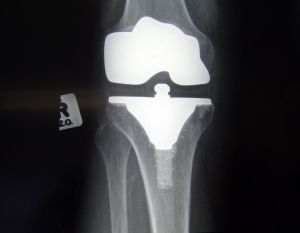Our work injury lawyers understand that preexisting conditions that are exacerbated by an on-the-job injury may require additional litigation.
 State Accident Fund v. SC Second Injury Fund, an appeal argued in the South Carolina Supreme Court, involved a police officer who injured his knee while on the job. The claimant was treating his knee with non-surgical options, including injections of corticosteroids. He reached his maximum medical improvement (MMI) and was given a permanent disability rating of approximately 30 percent.
State Accident Fund v. SC Second Injury Fund, an appeal argued in the South Carolina Supreme Court, involved a police officer who injured his knee while on the job. The claimant was treating his knee with non-surgical options, including injections of corticosteroids. He reached his maximum medical improvement (MMI) and was given a permanent disability rating of approximately 30 percent.
An MMI means that doctors have done everything feasible to treat an injury, and the cost of any additional treatment will outweigh any potential benefit. In the Commonwealth of Massachusetts, the Department of Industrial Accidents has created a guide for injured employees that explains this and other terms used.
In State Accident Fund, the claimant eventually had to undergo a total knee replacement after he reached his MMI. He was experiencing considerable pain and swelling prior to the surgery. The pain and swelling continued after the surgery, as well.
According to court records, the claimant had diabetes at the time of his injury, and his primary care doctor testified that, in her opinion, the knee injury contributed to the claimant’s diabetes-related complications. The respondent was aware of the claimant’s preexisting diabetes condition at the time of the injury.
The cost of the surgery was substantial and, according to testimony, was significantly higher than it would have been if the claimant did not suffer from diabetes. The claim for workers’ compensation coverage for the treatment was denied, and a hearing was conducted.
The administrative law judge (ALJ) affirmed the respondent’s denial of the reimbursement claim, and the claimant appealed this decision.
On appeal, the court reviewed the state statute that outlines what is required if an employee has a preexisting medical condition and also suffers a work-related-injury. If the injury would have happened anyway, but loss of work or cost of treatment was greater due to the preexisting condition, the employer shall provide a reimbursement for the total cost of the claimant’s injuries.
However, the employer shall then be reimbursed from the second injury fund for the additional amount that was due to the employee’s preexisting condition. The purpose of this law is that a disabled claimant can be fully compensated for his or on-the-job injuries while also not penalizing the employer for hiring a worker with a disability.
In State Accident Fund, the respondent claimed that the injured worker did not meet the requirements for a disability award under this statute. Basically, you two different funds that have been established to compensate disabled workers who are injured on-the-job fighting over who should pay for the injured workers’ knee operation, due to the fact that he also had diabetes.
Ultimately, the appellate court held that a reimbursement was appropriate under the state law as applied to the facts of this case. The important thing to keep in mind is that neither of these parties seemed all that interested in whether the injured worker was receiving a fair and appropriate workers’ compensation award for the knee injury he suffered while working as a police officer.
If you are injured on the job in Massachusetts, call Jeffrey Glassman Injury Lawyers for a free and confidential consultation to discuss your workers’ compensation claim: (617) 777-7777.
Additional Resources:
State Accident Fund v. SC Second Injury Fund, July 29, 2014, South Carolina Supreme Court.
More Blog Entries:
Frith v. WSI – Proving Worsening Condition Is Related to Work Injury, May 27, 2014.
 Massachusetts Workers Compensation Lawyers Blog
Massachusetts Workers Compensation Lawyers Blog

